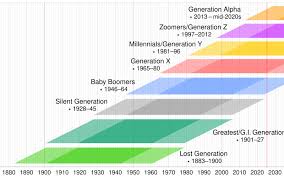
Introduction
Millennials, a generation born approximately between 1981 and 1996, have become a significant demographic force in society. As they navigate adulthood amidst economic challenges, technological advancements, and shifting social norms, understanding their preferences and influences is crucial for businesses, policymakers, and social analysts alike. As of 2023, millennials represent a substantial segment of the workforce and consumer base, making their impact on various sectors increasingly relevant.
Characteristics and Behaviours
Millennials are known for their adaptability and tech-savviness. Having grown up during the rise of the internet and mobile technology, they are proficient with digital tools and platforms. Recent studies from the Pew Research Centre reveal that 92% of millennials own smartphones, allowing them to stay connected and informed. This connectivity influences their purchasing decisions, with an emphasis on online shopping and social media engagement. Furthermore, millennials exhibit a strong preference for brands that align with their values, particularly in sustainability and corporate social responsibility.
Economic Impact
In the economic realm, millennials face unique challenges. Having entered the job market during the Great Recession, many are still grappling with student debt and housing affordability. According to a report by the Institute for Research on Poverty, nearly 40% of millennials have delayed major life milestones such as homeownership and starting families due to financial constraints. However, their economic behaviours, such as prioritising experiences over material possessions, have led to shifts in various industries, from travel to wellness. Businesses are restructuring their offerings to meet the preferences of this experience-driven demographic.
Social Influence
Socially, millennials have played a pivotal role in advancing conversations on diversity, equality, and mental health awareness. Their advocacy for inclusivity is shaping workplace cultures and expectations. As per a 2021 Deloitte survey, over 80% of millennials believe that businesses have a responsibility to address social issues. This social consciousness extends to their political engagement, with more millennials participating in civic activities and movements than previous generations.
Conclusion
In conclusion, millennials are not just a passing trend; they represent the future with a lasting impact on society. As businesses and institutions adapt to their values and preferences, understanding this generation’s challenges and motivations will be key to fostering a more inclusive and equitable environment. Moving forward, the importance of recognising and addressing millennials’ unique experiences cannot be overstated, as their influence on the economy, society, and culture continues to evolve in the years to come.
You may also like

The Unique Biodiversity and Culture of Madagascar

Baroness Longfield: A Voice for Children in the UK

The Rise and Influence of Kylie Jenner
SEARCH
LAST NEWS
- Remembering Wendy Richard: The Promise to Co-Star Natalie Cassidy
- How Did Anglian Water Achieve an ‘Essentials’ Rating for Mental Health Accessibility?
- Shai Hope Leads West Indies in T20 World Cup Clash Against South Africa
- What We Know About Weston McKennie: Future at Juventus and Past at Leeds
- What We Know About the Upcoming Live Nation Antitrust Trial